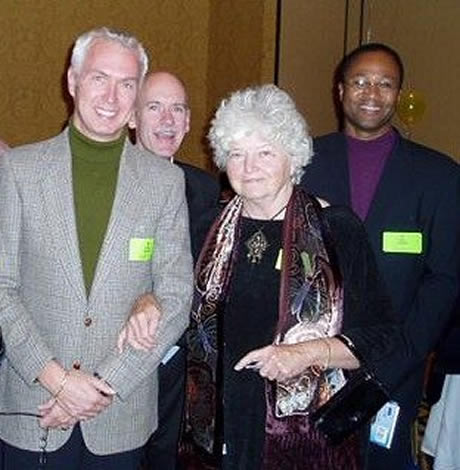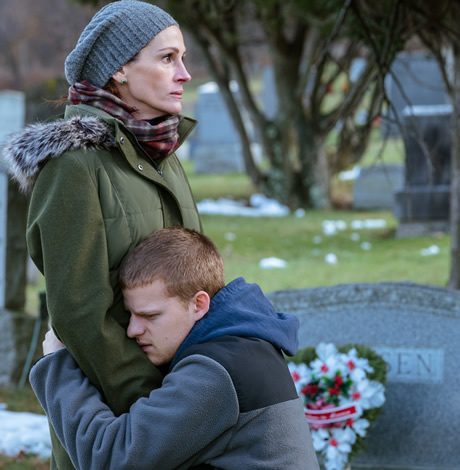homepage news
Patricia Nell Warren, author of ‘The Front Runner,’ dies at 82
The landmark novel was the first to print the word “gay” on the cover
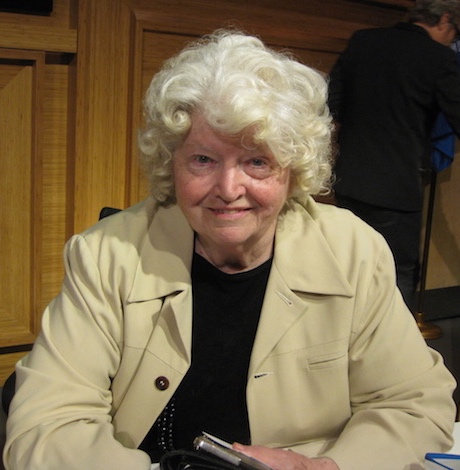
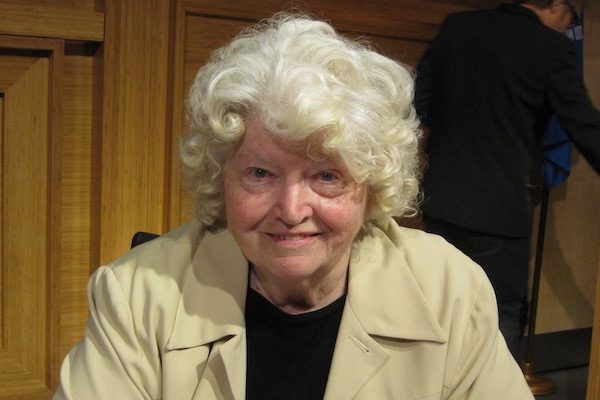
Patricia Nell Warren was noticeable anywhere.
That shock of curly white hair crowning the famous Montana-born lesbian was a beacon for nervously thrilled gay men to find the writer holding court at whatever event she attended. “You saved my life,” they told “The Front Runner” author over and over until the day before her death, according to her close friend Gregory Zanfardino. He and his best friend Darryl Davis were with Warren when she died on Saturday, Feb. 9 at UCLA Medical Center in Santa Monica after an almost three year struggle with lung cancer.
Warren was 82.
“She was an amazing friend. There’s nothing we wouldn’t do for her,” Zanfardino told the Los Angeles Blade by phone. “Up until her last moments, she was very clear. And she was constantly getting emails all the time from young people and older people who literally told her ‘The Front Runner’ saved their lives. That book still, to this day, inspires people.”
“The Front Runner” was a landmark gay novel published in 1974, five years after the Stonewall riots, one year before California officially decriminalized homosexuality; the first to print the word “gay” on the cover and the first to make the New York Times bestseller list.
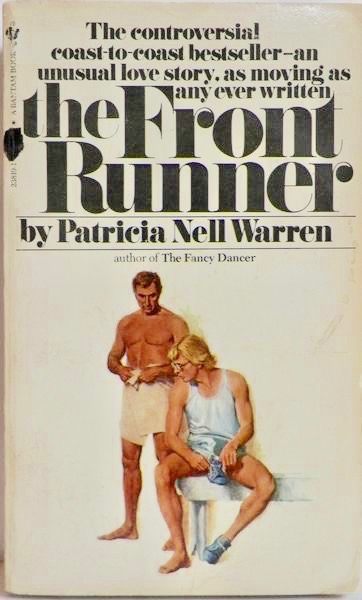
But while it is often tagged as a “gay love story of Coach Harlan Brown and his Olympic runner Billy Sive” in the 1970s, as publisher William Morrow first framed it, Warren intended it to be broader in scope.
The Front Runner is really about how closeted, masculine, conservative Vietnam Marine veteran Harlan Brown, 39, gave up his own dream of running in the Olympics, of coaching prospective Olympic athletes at a prestigious college, of quelling his own humanity out of fear of being exposed as gay. When he and gay distance runner Billy Sive, 22, fall in love at a small New England college, the world of sports rears up against Sive representing the US in the Olympic, where he meets with a horrific end.
“[T]he book’s prose had to be the voice of a conservative ex-Marine veteran who is at war with himself. He knows he’s gay and attracted to men, but he refuses to let himself feel, to let himself be that person he knows he is, because of his repressive Bible-taught family upbringing and military background,” Warren wrote for TheFrontRunnerMovie.com. “When Harlan finds himself falling secretly in love with Billy Sive, the conflict only intensifies and almost drives him mad, until he is finally “human” enough to give in and let himself be in love.”
After Billy is murdered in a hate crime on live TV, how can Harlan Brown go on? What becomes of him?
“One big reason why I wanted to paint the story so broadly, yet so personally, was that I hoped non-gay people would read the book as well as gay people,” Warren wrote. “When the book was written, as well as today, stereotypes of gay males as limp-wristed liberals is embedded in people’s minds. Harlan is a crusty gay ex-Marine, a drill-sergeant kind of guy. I wanted to confront readers with the inner reality of such a man because I know they exist.”
In fact, Zanfardino tells the Los Angeles Blade, Warren’s wish came true. Shortly before her death, Warren received an email from a straight woman who told her homophobic husband to read the book from beginning to end. Afterwards, he confessed that he never realized how people like him can hurt people. The book was a glimpse into the lives of two men who only wanted to love each other and do sports.
“The book touched hearts,” says Zanfardino.
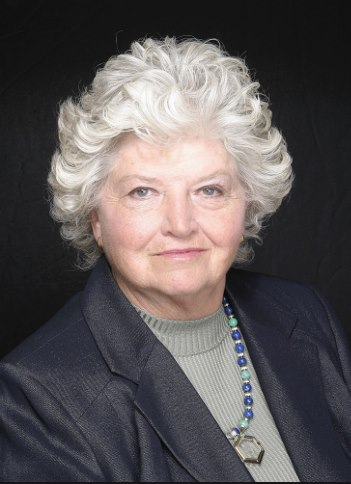
In 2011, Warren told The Bay Area Reporter that Sive was “inspired in part by distance runner Steve Prefontaine, as well as a few closeted runners that I got to know while being involved in open distance running myself.”
Prefontaine, who was straight, helped inspire the “running boom” of the 1970s. He died tragically in a car accident when he was 24. A movie about his life starred Jared Leto, who one critic suggested is “almost too pretty an actor to play the masculine, cocky runner.”
“I loved “The Front Runner,” Proteus Spann told the Los Angeles Blade during a discussion about his effort to get E. Lynn Harris’ “Invisible Life” made into a movie, noting that E. Lynn’s most famous character, Basil, was a professional football player.
“We’re all humans until society or we put up our flags and put a name on it. I knew of a former NFL player who frequented the Dupont Circle bars in DC. He was outed by a journalist in the early 90’s. He was cut from the team and this guy was massively masculine, great football player, star running back,” Spann said. “Was he still not a man even though he was gay? I think we get confused on the issue of masculinity and sexual identity.”
While Warren’s legacy is “The Front Runner” and the power of presenting gay men as masculine athletes and former fighting Marines, Warren’s life was more than just that book. In fact, she was her own version of an activist.
Patricia Nell Warren was born in 1936 and grew up on the Grant Kohrs cattle ranch near Deer Lodge, Montana. She started writing professionally in her teens in the 1950s, moving to New York in 1955 to attend Manhattanville College. She worked first as a copy editor, then a book editor at Reader’s Digest from 1959-1980. She married a Ukrainian emigre writer in 1960 and wrote four books of Ukranian poetry while stationed in Spain. She also wrote her first gay novel about a Spanish bullfighter’s relationship with a peasant under Franco’s fascism. “The Wild Man” would be published in in 2001 with an opening set in the gay West Hollywood bar, Numbers. Warren divorced her husband in 1973, according to a summary accompanying her papers at ONE National Gay & Lesbian Archives.
Warren started jogging while in Spain. “For me, at age 32 in 1968, distance running started out as a personal female challenge. Indeed, the runner’s need to reach deep inside and ‘find more’ spurred my self-discovery as a woman and my consciousness-raising concerning women’s rights,” she wrote in The Advocate in Aug. 1998.
“Only then, through running, could I finally catch up with those long-festering questions about sexual orientation. It dawned on me that sports are a major arena in which American society hard-wires ‘traditional’ notions about gender roles and orientation into its citizens,” she wrote.
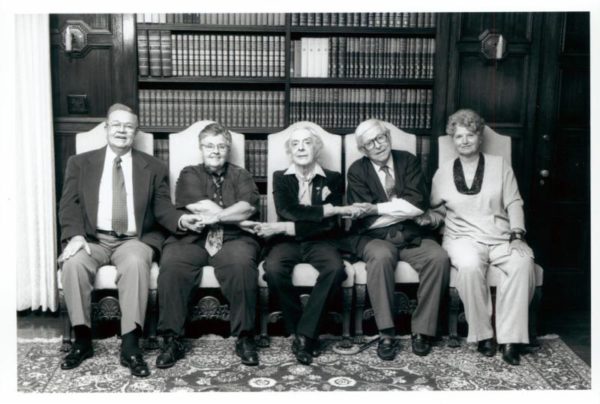
Warren took that consciousness-raising seriously. In 1969, she and 11 other women “outlaws crashed the Boston Marathon and ran the race without numbers, another fist was raised” in protest in the “athletes’ rights movement” that was “battling antiquated and hypocritical rules that still ran U.S. sports,” she wrote.
Warren was part of a cadre of women athletes and distance runners intent on forcing the Amateur Athletics Union to change the discriminatory rules under which women were permitted to run.
“Women had been barred from road races since 1961, as experts claimed distance running was damaging to their health and femininity. Some officials infamously warned that a woman’s uterus might fall out should she attempt to run such distances,” according to a story in the New York Times about the women runners who broke and changed the rules.
This was around the same time when proudly sexist 55-year old Bobby Riggs challenged 29-year old tennis star Billie Jean King to a nationally televised tennis match at the Houston Astrodome in 1973 known as “The Battle of the Sexes.” When King won, suddenly women athletes were taken more seriously—though King’s main issue of pay equity was still a battle.
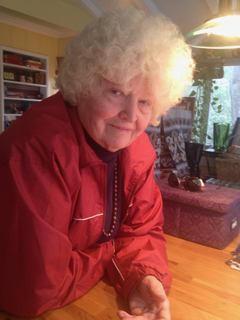
Warren fought battles off the running course, as well. She was the plaintiffs’ spokesperson for Susan Smith v. Reader’s Digest, a landmark case that resulted in a class-action victory for women.
“I was one of 18 women who filed Title VII charges against the Reader’s Digest,” Warren told Gay Today in 2003. “It was one of several major lawsuits against the media in the 1970’s. The media were full of talented and ambitious women who had been blatantly discriminated against—the very media that kept America informed on news from the civil-rights movement!”
TheDigest tried to dismiss the class-action aspect of the case. “But the federal judge – who was a woman! – didn’t buy their arguments. If the Digest had succeeded, it would have set a disastrous precedent for class actions,” she said.
Warren also worked on behalf of LGBT youth.
In 1994, she volunteered as a teacher at the West Hollywood-based EAGLES Center, a program for at-risk LGBT high school students. In 1996, she served on the LAUSD’s school Gay & Lesbian Education Commission and then in 1999, joined the Human Relations Education Commission. As a commissioner, she supported Project 10 and helped organize Youth Lobby Day, which became key in pressuring legislators during the knock-down fight for State Senator Sheila Kuehl’s AB222, the Dignity for All Students Act.
“I didn’t have a close relationship with her,” Project 10 founder Dr. Virginia Uribe tells the Los Angeles Blade. “But I admired what she did. ‘The Front Runner’ was a big influence on a lot of young people. When it came things like that, she was definitely a pioneer.”
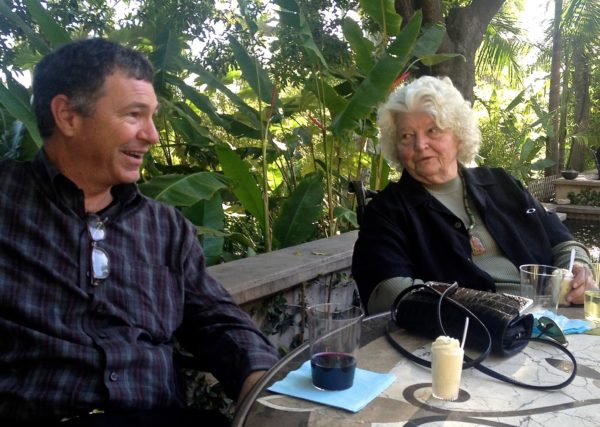
Gail Rolf, Uribe’s wife and the Education Director for the non-profit arm of Project 10, tells of how “The Front Runner” saved a student’s life.
Rolf was teaching at Alexander Hamilton High School and leading a Project 10 support group when she got word of a special education 12th grader who had attempted suicide just before Spring Break.
“He was very sweet and very conflicted about his sexuality. We sent him to see someone at Didi Hirsch (Mental Health Services) and then he came to the Project 10 support group,” Rolf says. “I had ‘The Front Runner’ paperback on the shelf so I gave it to him and told him to read it and keep the book as long as needed and then we’d talk about it. He came back weeks later with the pages folded—the book was ruined. He said, ‘This is the most fabulous book I’ve ever read. This book saved my life!”
He graduated and two years later came back to Models of Pride to say he’d come out and he was happy, Rolf says.
“We’ve lost an important voice for LGBT youth with the passing of Patricia Nell Warren. She was a fierce advocate for our youth. Her novels and many of her other work reflected that advocacy. Her writing also explored the complexity of youthful LGBT sexuality,” says Terry DeCrescenzo, former founder and executive director of Gay & Lesbian Adolescent Social Services (GLASS). “Her death silences an important voice.”
“When I came out as a gay man in 1990, my aunt gave me a copy of the Front Runner & I immediately read it. It was so influential for me & was part of my transition to fully embracing who I am. Patricia Nell Warren’s contribution to our community is a permanent one,” tweeted State Sen. Scott Wiener after Warren’s death was announced.
“It was one of the earliest books I read as a young lesbian. It was hard to find anything reflecting positively LGBTQ relationships when I came out in 1980-81. This was a jewel. Godspeed to Patricia Nell Warren,” State Sen. Toni Atkins tweeted.
Warren and Wildcat Press, the small publishing house she operated with then-business partner Tyler St. Mark, joined other plaintiffs in ACLU v. Reno and ACLU v. Reno II against the Justice Department “over right-wing federal legislation designed to promote censorship on the Internet and impede the online sale of gay and lesbian content,” her longtime friend Lance Webster says.
Webster and Warren worked with Senate Majority Leader Richard Polanco to write and pass SB1796, the Political Expression Protection Act to protect the rights of peaceful, non-violent protesters, based on an article she wrote entitled “Just Dissent.” Though the State Legislature overwhelmingly passed the bill, it was vetoed by Gov. Gray Davis.
During this time Warren not only continued to write articles, columns and books but she also joined the national LGBT site Bilerico as a blogger.
“When Patricia and I talked about our plans, she quickly volunteered to be our first new contributor. She was excited at the idea of speaking to a younger audience she didn’t know already and on issues that weren’t solely related to sports,” Bilerico co-founder Bil Browning tells the Los Angeles Blade, noting that her involvement enticed other contributors.
“Without her quiet voice of guidance and reassurance, I surely wouldn’t have been able to handle all of the responsibilities and attention that came with running a large site,” he says. “Her biggest commandment was to always respond to fan mail because it would make both the reader and the writer connect a little more closely.”
In 2007, Warren ran for a seat on the West Hollywood City Council. Though it was a long shot, she nonetheless did the due diligence producing astute policy analysis. That included a white paper on developing a true, single-payer comprehensive Universal Healthcare Coverage plan, as published by Smart Voter.
In it, she scrutinized the progressive healthcare system created by San Francisco Mayor Gavin Newsom—which she compared unfavorably to SB 840, legislation proposed by out Sen. Sheila Kuehl, Chair of the Senate Health Committee.
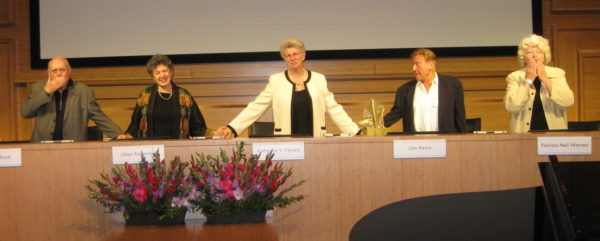
Warren also had an impact on her fellow writers. Anne Stockwell, former editor in chief of The Advocate and a cancer activist, visited Warren in a Glendale rehab facility a few months ago.
“She also told me she had cancer but didn’t make a big deal of that. She was sitting up in bed with her laptop, typing away on her fourth novel in The Front Runner series—which she apparently finished a couple weeks ago,” Stockwell says.
“Patricia really lived the values of her Montana childhood,” Stockwell adds. “She didn’t wait for permission to create or publish or act. She took the heat and led. She was an extraordinary American—we say that about a lot of people, but in her case it was true—and her vision of proud gay love helped to save a lot of lives, including mine.”
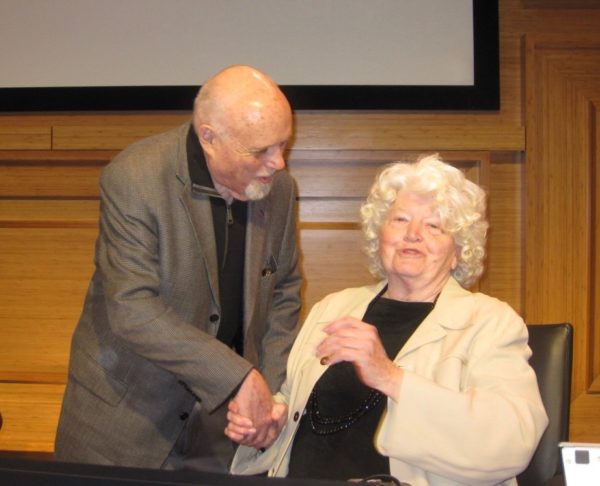
Steven Reigns, West Hollywood’s first official Poet Laureate, was also impacted by Warren.
“There is still a struggle for LGBTQ representation and it was especially acute in 1974 when Warren published The Front Runner,” Reigns tells the Los Angeles Blade, who discovered the book at the St. Louis public library in 1994. “I was far from athletic and yet I identified and empathized with Billy. It also felt subversive to read this gay novel by a lesbian who, at one point, edited my mother’s favorite publications—Reader’s Digest. The book illuminated for me that we were everywhere.”
And, he noted, “Though her imagination, she gave us mainstream representation and modeling,” including the creation of “Frontrunners” clubs worldwide.
One of the disappointments of Warren’s life was not having “The Front Runner” made into a movie. There have been so many rumors about the ups and downs of that endeavor—especially around actor Paul Newman as the first to option the work in 1975—that Warren and Zanfardino created a website devoted to the story, the history of the movie project and the prospect of having it finally produced in the near future.
The final entry on the movie history timeline reads: “2019 – February 9th, Patricia Warren loses her battle with cancer. Literary rights (print, film
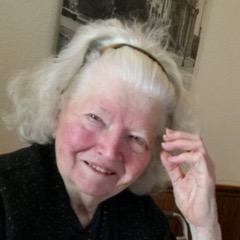
Making the movie was very much an imperative when Warren spoke with the Los Angeles Blade in Aug. 2017.
“I think it’s a good moment for a movie like that; the way the country is going, probably the timing is better than ever,” Warren said. “I’m really concerned about all the negativity about LGBT people that is going forward in the country right now, and that certainly will
homepage news
Honoring the legacy of New Orleans’ 1973 UpStairs Lounge fire
Why the arson attack that killed 32 gay men still resonates 50 years later

On June 23 of last year, I held the microphone as a gay man in the New Orleans City Council Chamber and related a lost piece of queer history to the seven council members. I told this story to disabuse all New Orleanians of the notion that silence and accommodation, in the face of institutional and official failures, are a path to healing.
The story I related to them began on a typical Sunday night at a second-story bar on the fringe of New Orleans’ French Quarter in 1973, where working-class men would gather around a white baby grand piano and belt out the lyrics to a song that was the anthem of their hidden community, “United We Stand” by the Brotherhood of Man.
“United we stand,” the men would sing together, “divided we fall” — the words epitomizing the ethos of their beloved UpStairs Lounge bar, an egalitarian free space that served as a forerunner to today’s queer safe havens.
Around that piano in the 1970s Deep South, gays and lesbians, white and Black queens, Christians and non-Christians, and even early gender minorities could cast aside the racism, sexism, and homophobia of the times to find acceptance and companionship for a moment.
For regulars, the UpStairs Lounge was a miracle, a small pocket of acceptance in a broader world where their very identities were illegal.
On the Sunday night of June 24, 1973, their voices were silenced in a murderous act of arson that claimed 32 lives and still stands as the deadliest fire in New Orleans history — and the worst mass killing of gays in 20th century America.
As 13 fire companies struggled to douse the inferno, police refused to question the chief suspect, even though gay witnesses identified and brought the soot-covered man to officers idly standing by. This suspect, an internally conflicted gay-for-pay sex worker named Rodger Dale Nunez, had been ejected from the UpStairs Lounge screaming the word “burn” minutes before, but New Orleans police rebuffed the testimony of fire survivors on the street and allowed Nunez to disappear.
As the fire raged, police denigrated the deceased to reporters on the street: “Some thieves hung out there, and you know this was a queer bar.”
For days afterward, the carnage met with official silence. With no local gay political leaders willing to step forward, national Gay Liberation-era figures like Rev. Troy Perry of the Metropolitan Community Church flew in to “help our bereaved brothers and sisters” — and shatter officialdom’s code of silence.
Perry broke local taboos by holding a press conference as an openly gay man. “It’s high time that you people, in New Orleans, Louisiana, got the message and joined the rest of the Union,” Perry said.
Two days later, on June 26, 1973, as families hesitated to step forward to identify their kin in the morgue, UpStairs Lounge owner Phil Esteve stood in his badly charred bar, the air still foul with death. He rebuffed attempts by Perry to turn the fire into a call for visibility and progress for homosexuals.
“This fire had very little to do with the gay movement or with anything gay,” Esteve told a reporter from The Philadelphia Inquirer. “I do not want my bar or this tragedy to be used to further any of their causes.”
Conspicuously, no photos of Esteve appeared in coverage of the UpStairs Lounge fire or its aftermath — and the bar owner also remained silent as he witnessed police looting the ashes of his business.
“Phil said the cash register, juke box, cigarette machine and some wallets had money removed,” recounted Esteve’s friend Bob McAnear, a former U.S. Customs officer. “Phil wouldn’t report it because, if he did, police would never allow him to operate a bar in New Orleans again.”
The next day, gay bar owners, incensed at declining gay bar traffic amid an atmosphere of anxiety, confronted Perry at a clandestine meeting. “How dare you hold your damn news conferences!” one business owner shouted.
Ignoring calls for gay self-censorship, Perry held a 250-person memorial for the fire victims the following Sunday, July 1, culminating in mourners defiantly marching out the front door of a French Quarter church into waiting news cameras. “Reverend Troy Perry awoke several sleeping giants, me being one of them,” recalled Charlene Schneider, a lesbian activist who walked out of that front door with Perry.

Esteve doubted the UpStairs Lounge story’s capacity to rouse gay political fervor. As the coroner buried four of his former patrons anonymously on the edge of town, Esteve quietly collected at least $25,000 in fire insurance proceeds. Less than a year later, he used the money to open another gay bar called the Post Office, where patrons of the UpStairs Lounge — some with visible burn scars — gathered but were discouraged from singing “United We Stand.”
New Orleans cops neglected to question the chief arson suspect and closed the investigation without answers in late August 1973. Gay elites in the city’s power structure began gaslighting the mourners who marched with Perry into the news cameras, casting suspicion on their memories and re-characterizing their moment of liberation as a stunt.
When a local gay journalist asked in April 1977, “Where are the gay activists in New Orleans?,” Esteve responded that there were none, because none were needed. “We don’t feel we’re discriminated against,” Esteve said. “New Orleans gays are different from gays anywhere else… Perhaps there is some correlation between the amount of gay activism in other cities and the degree of police harassment.”

An attitude of nihilism and disavowal descended upon the memory of the UpStairs Lounge victims, goaded by Esteve and fellow gay entrepreneurs who earned their keep via gay patrons drowning their sorrows each night instead of protesting the injustices that kept them drinking.
Into the 1980s, the story of the UpStairs Lounge all but vanished from conversation — with the exception of a few sanctuaries for gay political debate such as the local lesbian bar Charlene’s, run by the activist Charlene Schneider.
By 1988, the 15th anniversary of the fire, the UpStairs Lounge narrative comprised little more than a call for better fire codes and indoor sprinklers. UpStairs Lounge survivor Stewart Butler summed it up: “A tragedy that, as far as I know, no good came of.”
Finally, in 1991, at Stewart Butler and Charlene Schneider’s nudging, the UpStairs Lounge story became aligned with the crusade of liberated gays and lesbians seeking equal rights in Louisiana. The halls of power responded with intermittent progress. The New Orleans City Council, horrified by the story but not yet ready to take its look in the mirror, enacted an anti-discrimination ordinance protecting gays and lesbians in housing, employment, and public accommodations that Dec. 12 — more than 18 years after the fire.
“I believe the fire was the catalyst for the anger to bring us all to the table,” Schneider told The Times-Picayune, a tacit rebuke to Esteve’s strategy of silent accommodation. Even Esteve seemed to change his stance with time, granting a full interview with the first UpStairs Lounge scholar Johnny Townsend sometime around 1989.
Most of the figures in this historic tale are now deceased. What’s left is an enduring story that refused to go gently. The story now echoes around the world — a musical about the UpStairs Lounge fire recently played in Tokyo, translating the gay underworld of the 1973 French Quarter for Japanese audiences.
When I finished my presentation to the City Council last June, I looked up to see the seven council members in tears. Unanimously, they approved a resolution acknowledging the historic failures of city leaders in the wake of the UpStairs Lounge fire.
Council members personally apologized to UpStairs Lounge families and survivors seated in the chamber in a symbolic act that, though it could not bring back those who died, still mattered greatly to those whose pain had been denied, leaving them to grieve alone. At long last, official silence and indifference gave way to heartfelt words of healing.
The way Americans remember the past is an active, ongoing process. Our collective memory is malleable, but it matters because it speaks volumes about our maturity as a people, how we acknowledge the past’s influence in our lives, and how it shapes the examples we set for our youth. Do we grapple with difficult truths, or do we duck accountability by defaulting to nostalgia and bluster? Or worse, do we simply ignore the past until it fades into a black hole of ignorance and indifference?
I believe that a factual retelling of the UpStairs Lounge tragedy — and how, 50 years onward, it became known internationally — resonates beyond our current divides. It reminds queer and non-queer Americans that ignoring the past holds back the present, and that silence is no cure for what ails a participatory nation.
Silence isolates. Silence gaslights and shrouds. It preserves the power structures that scapegoat the disempowered.
Solidarity, on the other hand, unites. Solidarity illuminates a path forward together. Above all, solidarity transforms the downtrodden into a resounding chorus of citizens — in the spirit of voices who once gathered ‘round a white baby grand piano and sang, joyfully and loudly, “United We Stand.”

Robert W. Fieseler is a New Orleans-based journalist and the author of “Tinderbox: the Untold Story of the Up Stairs Lounge Fire and the Rise of Gay Liberation.”
homepage news
New Supreme Court term includes critical LGBTQ case with ‘terrifying’ consequences
Business owner seeks to decline services for same-sex weddings

The U.S. Supreme Court, after a decision overturning Roe v. Wade that still leaves many reeling, is starting a new term with justices slated to revisit the issue of LGBTQ rights.
In 303 Creative v. Elenis, the court will return to the issue of whether or not providers of custom-made goods can refuse service to LGBTQ customers on First Amendment grounds. In this case, the business owner is Lorie Smith, a website designer in Colorado who wants to opt out of providing her graphic design services for same-sex weddings despite the civil rights law in her state.
Jennifer Pizer, acting chief legal officer of Lambda Legal, said in an interview with the Blade, “it’s not too much to say an immeasurably huge amount is at stake” for LGBTQ people depending on the outcome of the case.
“This contrived idea that making custom goods, or offering a custom service, somehow tacitly conveys an endorsement of the person — if that were to be accepted, that would be a profound change in the law,” Pizer said. “And the stakes are very high because there are no practical, obvious, principled ways to limit that kind of an exception, and if the law isn’t clear in this regard, then the people who are at risk of experiencing discrimination have no security, no effective protection by having a non-discrimination laws, because at any moment, as one makes their way through the commercial marketplace, you don’t know whether a particular business person is going to refuse to serve you.”
The upcoming arguments and decision in the 303 Creative case mark a return to LGBTQ rights for the Supreme Court, which had no lawsuit to directly address the issue in its previous term, although many argued the Dobbs decision put LGBTQ rights in peril and threatened access to abortion for LGBTQ people.
And yet, the 303 Creative case is similar to other cases the Supreme Court has previously heard on the providers of services seeking the right to deny services based on First Amendment grounds, such as Masterpiece Cakeshop and Fulton v. City of Philadelphia. In both of those cases, however, the court issued narrow rulings on the facts of litigation, declining to issue sweeping rulings either upholding non-discrimination principles or First Amendment exemptions.
Pizer, who signed one of the friend-of-the-court briefs in opposition to 303 Creative, said the case is “similar in the goals” of the Masterpiece Cakeshop litigation on the basis they both seek exemptions to the same non-discrimination law that governs their business, the Colorado Anti-Discrimination Act, or CADA, and seek “to further the social and political argument that they should be free to refuse same-sex couples or LGBTQ people in particular.”
“So there’s the legal goal, and it connects to the social and political goals and in that sense, it’s the same as Masterpiece,” Pizer said. “And so there are multiple problems with it again, as a legal matter, but also as a social matter, because as with the religion argument, it flows from the idea that having something to do with us is endorsing us.”
One difference: the Masterpiece Cakeshop litigation stemmed from an act of refusal of service after owner, Jack Phillips, declined to make a custom-made wedding cake for a same-sex couple for their upcoming wedding. No act of discrimination in the past, however, is present in the 303 Creative case. The owner seeks to put on her website a disclaimer she won’t provide services for same-sex weddings, signaling an intent to discriminate against same-sex couples rather than having done so.
As such, expect issues of standing — whether or not either party is personally aggrieved and able bring to a lawsuit — to be hashed out in arguments as well as whether the litigation is ripe for review as justices consider the case. It’s not hard to see U.S. Chief Justice John Roberts, who has sought to lead the court to reach less sweeping decisions (sometimes successfully, and sometimes in the Dobbs case not successfully) to push for a decision along these lines.
Another key difference: The 303 Creative case hinges on the argument of freedom of speech as opposed to the two-fold argument of freedom of speech and freedom of religious exercise in the Masterpiece Cakeshop litigation. Although 303 Creative requested in its petition to the Supreme Court review of both issues of speech and religion, justices elected only to take up the issue of free speech in granting a writ of certiorari (or agreement to take up a case). Justices also declined to accept another question in the petition request of review of the 1990 precedent in Smith v. Employment Division, which concluded states can enforce neutral generally applicable laws on citizens with religious objections without violating the First Amendment.
Representing 303 Creative in the lawsuit is Alliance Defending Freedom, a law firm that has sought to undermine civil rights laws for LGBTQ people with litigation seeking exemptions based on the First Amendment, such as the Masterpiece Cakeshop case.
Kristen Waggoner, president of Alliance Defending Freedom, wrote in a Sept. 12 legal brief signed by her and other attorneys that a decision in favor of 303 Creative boils down to a clear-cut violation of the First Amendment.
“Colorado and the United States still contend that CADA only regulates sales transactions,” the brief says. “But their cases do not apply because they involve non-expressive activities: selling BBQ, firing employees, restricting school attendance, limiting club memberships, and providing room access. Colorado’s own cases agree that the government may not use public-accommodation laws to affect a commercial actor’s speech.”
Pizer, however, pushed back strongly on the idea a decision in favor of 303 Creative would be as focused as Alliance Defending Freedom purports it would be, arguing it could open the door to widespread discrimination against LGBTQ people.
“One way to put it is art tends to be in the eye of the beholder,” Pizer said. “Is something of a craft, or is it art? I feel like I’m channeling Lily Tomlin. Remember ‘soup and art’? We have had an understanding that whether something is beautiful or not is not the determining factor about whether something is protected as artistic expression. There’s a legal test that recognizes if this is speech, whose speech is it, whose message is it? Would anyone who was hearing the speech or seeing the message understand it to be the message of the customer or of the merchants or craftsmen or business person?”
Despite the implications in the case for LGBTQ rights, 303 Creative may have supporters among LGBTQ people who consider themselves proponents of free speech.
One joint friend-of-the-court brief before the Supreme Court, written by Dale Carpenter, a law professor at Southern Methodist University who’s written in favor of LGBTQ rights, and Eugene Volokh, a First Amendment legal scholar at the University of California, Los Angeles, argues the case is an opportunity to affirm the First Amendment applies to goods and services that are uniquely expressive.
“Distinguishing expressive from non-expressive products in some contexts might be hard, but the Tenth Circuit agreed that Smith’s product does not present a hard case,” the brief says. “Yet that court (and Colorado) declined to recognize any exemption for products constituting speech. The Tenth Circuit has effectively recognized a state interest in subjecting the creation of speech itself to antidiscrimination laws.”
Oral arguments in the case aren’t yet set, but may be announced soon. Set to defend the state of Colorado and enforcement of its non-discrimination law in the case is Colorado Solicitor General Eric Reuel Olson. Just this week, the U.S. Supreme Court announced it would grant the request to the U.S. solicitor general to present arguments before the justices on behalf of the Biden administration.
With a 6-3 conservative majority on the court that has recently scrapped the super-precedent guaranteeing the right to abortion, supporters of LGBTQ rights may think the outcome of the case is all but lost, especially amid widespread fears same-sex marriage would be next on the chopping block. After the U.S. Tenth Circuit Court of Appeals ruled against 303 Creative in the lawsuit, the simple action by the Supreme Court to grant review in the lawsuit suggests they are primed to issue a reversal and rule in favor of the company.
Pizer, acknowledging the call to action issued by LGBTQ groups in the aftermath of the Dobbs decision, conceded the current Supreme Court issuing the ruling in this case is “a terrifying prospect,” but cautioned the issue isn’t so much the makeup of the court but whether or not justices will continue down the path of abolishing case law.
“I think the question that we’re facing with respect to all of the cases or at least many of the cases that are in front of the court right now, is whether this court is going to continue on this radical sort of wrecking ball to the edifice of settled law and seemingly a goal of setting up whole new structures of what our basic legal principles are going to be. Are we going to have another term of that?” Pizer said. “And if so, that’s terrifying.”
homepage news
Kelley Robinson, a Black, queer woman, named president of Human Rights Campaign
Progressive activist a veteran of Planned Parenthood Action Fund

Kelley Robinson, a Black, queer woman and veteran of Planned Parenthood Action Fund, is to become the next president of the Human Rights Campaign, the nation’s leading LGBTQ group announced on Tuesday.
Robinson is set to become the ninth president of the Human Rights Campaign after having served as executive director of Planned Parenthood Action Fund and more than 12 years of experience as a leader in the progressive movement. She’ll be the first Black, queer woman to serve in that role.
“I’m honored and ready to lead HRC — and our more than three million member-advocates — as we continue working to achieve equality and liberation for all Lesbian, Gay, Bisexual, Transgender, and Queer people,” Robinson said. “This is a pivotal moment in our movement for equality for LGBTQ+ people. We, particularly our trans and BIPOC communities, are quite literally in the fight for our lives and facing unprecedented threats that seek to destroy us.”
The next Human Rights Campaign president is named as Democrats are performing well in polls in the mid-term elections after the U.S. Supreme Court overturned Roe v. Wade, leaving an opening for the LGBTQ group to play a key role amid fears LGBTQ rights are next on the chopping block.
“The overturning of Roe v. Wade reminds us we are just one Supreme Court decision away from losing fundamental freedoms including the freedom to marry, voting rights, and privacy,” Robinson said. “We are facing a generational opportunity to rise to these challenges and create real, sustainable change. I believe that working together this change is possible right now. This next chapter of the Human Rights Campaign is about getting to freedom and liberation without any exceptions — and today I am making a promise and commitment to carry this work forward.”
The Human Rights Campaign announces its next president after a nearly year-long search process after the board of directors terminated its former president Alphonso David when he was ensnared in the sexual misconduct scandal that led former New York Gov. Andrew Cuomo to resign. David has denied wrongdoing and filed a lawsuit against the LGBTQ group alleging racial discrimination.

-

 State Department4 days ago
State Department4 days agoState Department releases annual human rights report
-

 South America2 days ago
South America2 days agoArgentina government dismisses transgender public sector employees
-

 District of Columbia2 days ago
District of Columbia2 days agoCatching up with the asexuals and aromantics of D.C.
-

 Politics5 days ago
Politics5 days agoSmithsonian staff concerned about future of LGBTQ programming amid GOP scrutiny

